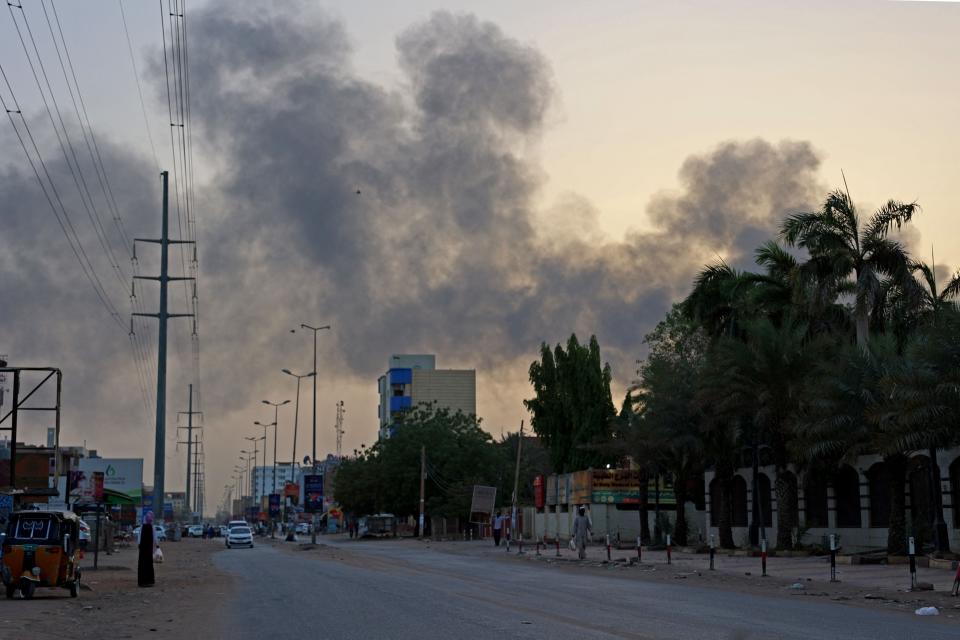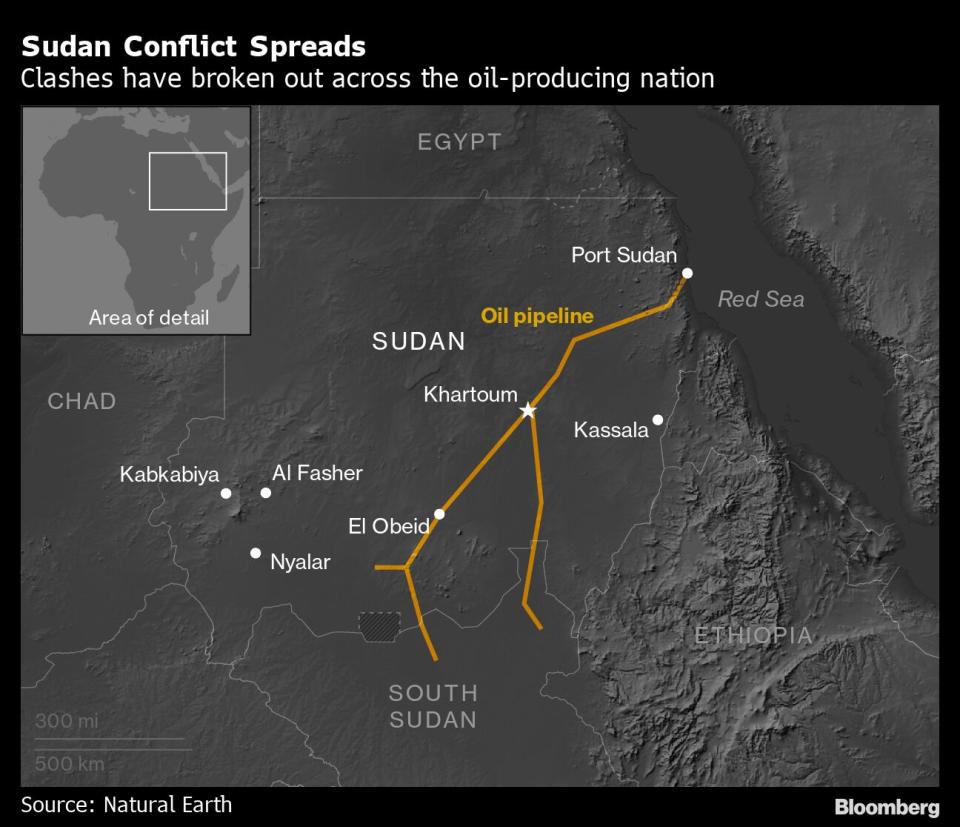Sudan Ex-Warlord Rebuffs Cease-Fire as Conflict Escalates
(Bloomberg) -- The Sudanese paramilitary group battling the army for control of the North African nation ruled out a cease-fire as diplomats struggled to halt fighting that threaten to erupt into a full-blown civil war.
Most Read from Bloomberg
Worthless Degrees Are Creating an Unemployable Generation in India
Fox to Pay $787 Million to Settle Election Suit, Dominion Says
Russian Memo Said War Leaves Moscow Too Reliant on Chinese Tech
Apple's AR/VR Headset to Feature Sports, Gaming, iPad Apps and Workouts
A Guide to Dating for Over 40s in the New Era of Divorce, STDs and Tinder
Clashes resumed at dawn in the capital, Khartoum, on Monday and continued throughout the day, with some of the most intense violence around the main international airport and army headquarters, along with the neighboring city of Omdurman. Hospitals in the capital were hit by heavy artillery, doctors and labor unions said. The death toll climbed to more than 180, with at least 1,800 people injured, according to the United Nations.
Representatives from the United Arab Emirates, the UK, US and Saudi Arabia — a group known as the quad that tried to restore elements of civilian rule after a 2021 coup in the North African country — made calls to both parties to halt the hostilities, said western diplomats who asked not to be identified. African Union Commission President Moussa Faki Mahamat is preparing to travel to Sudan to try and negotiate a cease-fire, the continental body said in a statement.
“Right now is not the time to deal with this kind of initiative or cease-fire because the Sudanese Armed Forces are losing control,” said Yousif Ezzat, chief political adviser to Mohamed Hamdan Dagalo, the head of the Rapid Support Forces paramilitary group.
The conflict erupted on Saturday after a long-simmering dispute between the army under Abdel Fattah al-Burhan and the RSF. The fighting throws into chaos plans for a power-sharing government that was supposed to lead Sudan to democratic elections after the coup. A deal was seen as a way to restore billions of dollars of frozen aid and was being closely monitored by Western powers and Russia and China, which covet its strategic Red Sea coastline and mineral resources.
Read more: These Are the Key Foreign Power Brokers in the Sudan Conflict
On a visit to Japan for a gathering of G-7 foreign ministers, US Secretary of State Antony Blinken spoke separately with both al-Burhan and Dagalo and “underscored the urgency of reaching a ceasefire,” according to a statement on Tuesday.
With neither appearing willing to back down, the conflict is likely to be protracted, Verisk Maplecroft said in a research note. That raises the risk of refugees fleeing into a wider region already reeling from conflicts in Libya, Ethiopia, South Sudan and Somalia, and of neighboring countries joining the fighting, it said.
“Each side has been supported by different regional states, the army by Egypt and the RSF by the UAE,” Verisk Maplecroft said. Oil exports from South Sudan may also be disrupted in coming weeks — the majority of the neighboring country’s oil is refined at a facility north of Khartoum that’s close to the fighting, it said.
The RSF’s Ezzat claimed Burhan had lost control of the army general command and his office, leaving him without the authority to negotiate with the RSF. Multiple calls to a spokesman for the Sudanese army went unanswered when Bloomberg sought comment.
In a statement Monday, the army said buildings around its headquarters had been targeted, but they had not been overrun.
“To suggest that these headquarters have fallen into the hands of the rebels are in line with campaigns to mislead public opinion,” it said. “We are holding on to all our headquarters, and we are getting very close to the moment of decisiveness”
In addition to fighting in Khartoum, there have also been clashes in el-Fasher in the western region of Darfur over control of the airport, as well as Nyala in South Darfur. Further skirmishes took place in Blue Nile state near the border with Ethiopia and in Port Sudan, a key trading zone and crucial conduit for the oil that arrives by pipelines from South Sudan.
Residents of the capital including Adele Ali, a civil engineer who lives near the airport, said there’d been no power and water for two days. People are scared to go outside their houses for fear they’ll be attacked and their possessions looted, he said.
“Each party is claiming they are doing the right thing,” he said by phone. “From our point of view they are both wrong.”
What’s Behind the Fighting in Sudan and What It Means: QuickTake
The European Union ambassador to Sudan was assaulted in his residence on Monday, EU foreign policy chief Josep Borrell wrote on Twitter.
“This constitutes a gross violation of the Vienna Convention,” Borrell said. “Security of diplomatic premises and staff is a primary responsibility of Sudanese authorities and an obligation under international law.”
--With assistance from Iain Marlow, Zainab Fattah, Arijit Ghosh and Michael Gunn.
(Updates death toll in second paragraph.)
Most Read from Bloomberg Businessweek
Americans Go Deeper Into Debt as They Use Buy Now, Pay Later Apps for Groceries
People Are Using AI for Therapy, Even Though ChatGPT Wasn’t Built for It
A Decade After the Rana Plaza Collapse, Garment Workers Are Still Exploited
©2023 Bloomberg L.P.



